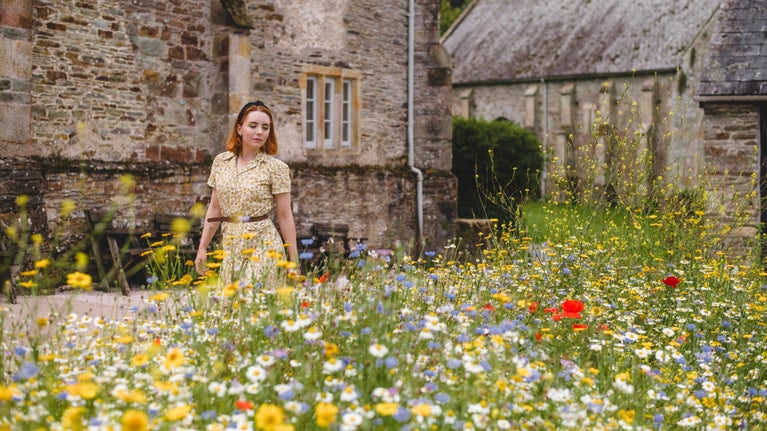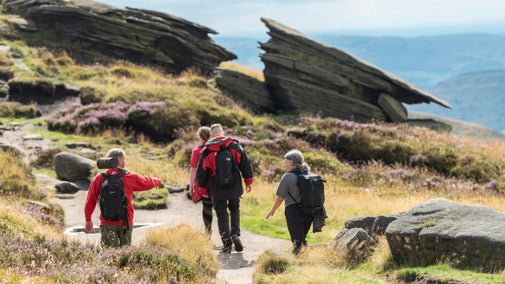Climate Action at Buckland Abbey
- Published:
- 08 May 2025

Climate change is on everyone's mind. Whether it's the prolonged hotter weather having an effect on our gardens, or microplastics in our food, it's a challenge that we are all facing. We can all play a part in reducing carbon emissions and adapting to the changes we're seeing - read on to find out more about our work here at Buckland Abbey and discover tips to try at home.
The Community Forest Project
Over the next 2 years (April 2024-6), we are delighted to be working in partnership with Plymouth and South Devon Community Forest, and with grant funding from Defra’s Trees for Climate fund we’ll create, restore and connect around 50 hectares (ha) of new priority habitat – that’s about the same area as 128 football fields. This will include a combination of lowland mixed deciduous woodland, traditional orchard, wood pasture and parkland and hedgerows.
‘Bigger, better and more joined up’ is our mantra, and since 2015, Buckland Abbey has been working to meet the aims of the National Trust’s Land, Outdoors and Nature strategy; creating and restoring priority habitats, ensuring nature recovery and improving biodiversity, carbon sequestration and natural flood management.
We have explored our historic environment and natural heritage aiming to restore some historical features to the landscape, such as an orchard thought to be one of the first of its kind in Devon.
We’ll be planting over 30,000 trees including 356 fruit and nut trees to bring a medieval landscape to life.
To discover more, take a look at the article link below.

Lowland meadow restoration
Many of us will be aware of the shocking statistic that around 97% of wildflower meadows in the UK have been lost since the Second World War. With this has come a rapid decline in populations of pollinators and other insects, small mammals and birds; a deterioration in soil quality and reduced natural flood defences.
Here at Buckland Abbey, we are restoring 50 hectares of lowland meadow habitats through a lengthy but rewarding process of resting, seeding, grazing, cutting and removing, and we're now beginning to see the rewards as flowers such as Birds-foot trefoil - a food source for most adult butterflies - Yarrow, Red Clover, Knapweed, Plantain, Hawkbits, Eyebright, Speedwell and Self-heal return.
These plants are not only painting the fields with colour, but storing carbon, fixing nitrogen, improving the soil and creating rich habitats.
Renewable energy
As a part of the National Trust's committment to achieving net zero carbon emissions by 2030, we're always looking at ways to become more energy efficient here at Buckland.
Beyond the relatively easy tasks of switching as much of our lighting to LED as possible, replacing our machinery with electric kit when appropriate and ensuring that we carefully monitor our water meters, we've already undertaken some larger projects that have made a big difference to our carbon footprint.
Since 2017, a biomass boiler has provided heating for the Abbey. Using wood pellets as fuel, this sustainable heating source is estimated to save 37 tonnes of carbon emissions per year.
There's also a solar array which generates electricity for the toilets in the car park - you might see this as you walk towards Visitor Welcome when you arrive.
Interested in how we use renewable energy at the places we look after? Find out more using the link below.
Get involved
Want to do your bit for nature and climate, but not sure where to begin? Here are some ideas to get you started.
How you can help tackle climate change
The climate crisis can be overwhelming, but small actions can help make big changes. Find out how you can play your part with ideas from planting trees to going peat-free.

National Trust, RSPB and WWF join forces to save UK nature
We're urging everyone to help us stop the destruction of nature in the UK with the launch of Save Our Wild Isles, a joint campaign with charities RSPB and WWF. Discover a new documentary about the changes needed to save nature and find out what you can do to help.

Adopt a Plot
Nature is depleting faster in the UK than almost anywhere else in the world. Donating to Adopt a Plot is a small way you can take a big step towards restoring nature across landscapes.

How we're tackling climate change
Climate change is the single biggest threat to the places we care for. Take a look at our environmental pledges as we adapt, reduce carbon emissions and address the damage already done.




